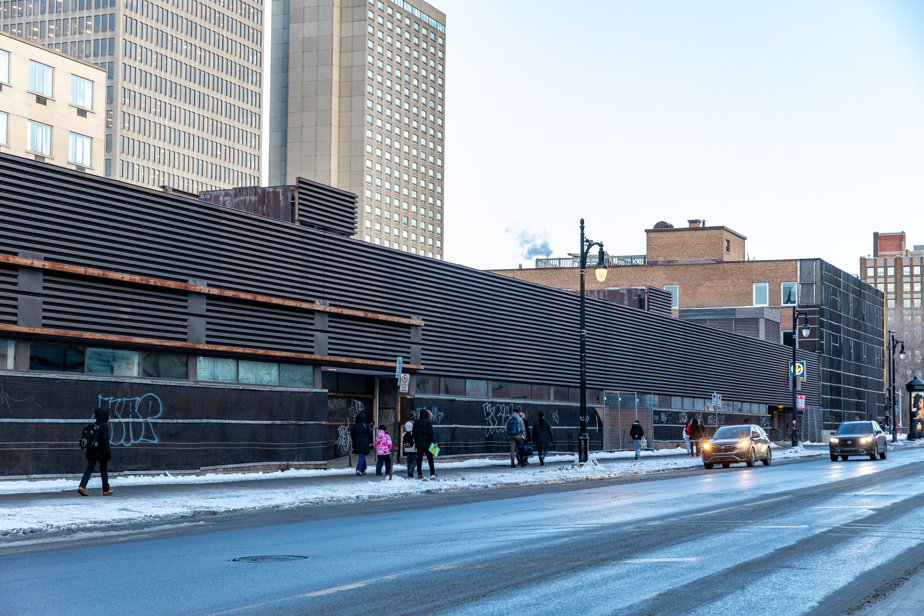Montreal is officially putting the Voyageur South island up for sale and asking for a minimum of $20 million. This vast transformation project, which will take place in a neighborhood with dire needs, will, as planned, have to make an important place for social and affordable housing.
In a document published on the Quebec government’s electronic tender system (SEAO), the Plante administration immediately reiterates that the project must be entirely rental and provide for a “minimum ratio” of 20% of social housing. and 20% affordable housing. Montreal reveals that the amount of the sale can “in no case be less” than 20 million, under penalty of automatic refusal.
On of Montreal’s most strategic land at a fraction of the price, with profitable terms.”
“We are giving ourselves the means to ensure that it is built quickly and efficiently,” she argued, certifying that the call for tenders had been set up so that “it arouses strong interest from the market.” “.
In January, the City of Montreal mentioned that it wanted a complex of 700 apartments to replace the old bus station located on the corner of Berri and De Maisonneuve, in a neighborhood where housing needs are dire. However, this figure is not found in the call for tenders. Mayor Plante said she wanted construction to begin in the summer of 2025.

PHOTO MARTIN TREMBLAY, LA PRESSE ARCHIVES
Aerial view of Voyageur Island, at the corner of Berri Street and De Maisonneuve Boulevard, in 2017
The Voyageur block, which houses this decaying building, has belonged to the City since 2018, the latter having bought it from the government for 18 million. The municipality was initially supposed to launch a call for tenders before the health crisis, but the process was delayed. “After the pandemic, we saw that the scenarios on the table contained too many offices for the current reality,” says the head of housing, Benoit Dorais.
Criteria
Several conditions are put forward, including a ground floor designed to “reinforce the socio-economic dynamism of the sector”. More clearly, Montreal favors the presence of cafes and terraces, and warns that the developments must “avoid nooks and alcoves conducive to incivility”.
Promoters are also invited to “pay particular attention to the facade of Maisonneuve Boulevard, which is of crucial importance because of its interface with Émilie-Gamelin Park.” “We want a project that will contribute to the community. That’s what’s important,” summarizes Benoit Dorais.
Finally, it would be better to recommend high volumes, says the City, which sees this as a way of “closing the perspective and framing the public space”, especially since the future building will be able to be seen from the lookout point of Mount Royal.
On the mobility side, we maintain that the ideal would be to connect the building to the metro, but above all to concentrate car access on rue Saint-Hubert, “so as to limit direct access via streets Berri and De Maisonneuve”.
The presence of ongoing construction by the Société de transport de Montréal (STM), which has been replacing the waterproofing system of the underground roof of the Berri-UQAM station since 2022, will also have to be taken into account. The Voyageur South island construction site “could be impacted” by this work, according to the administration.
On the other side of Berri Street, Hydro-Québec also wants to erect an electrical substation in the heart of the neighborhood, which raises significant criticism, reported The Press in January. There is currently a grassy area at this location.
The criticized delays
In opposition, we especially deplore the delays around the project. “After having wandered for six years with the Voyageur Island site, Projet Montréal allowed itself the luxury of launching the call for tenders aimed at developing it three months after having made the announcement with great fanfare. The Plante administration has a perception of time that has no place in the middle of a housing crisis,” says advisor Julien Hénault-Ratelle.
Mayor Plante initially announced on January 12 the imminent publication of a call for tenders. Everything will therefore have been almost two and a half months late.
“The delays, coupled with the prior constraints imposed on developers as well as the impacts caused by the numerous construction sites around the site, make us pessimistic about the future of this essential project,” believes Mr. Hénault-Ratelle.
The story so far
- 2010: Quebec buys the Voyageur islet.
- 2013: The Parti Québécois government announces the construction of a government complex.
- 2017: The Société québécoise des infrastructures (SQI) abandons the project.
- 2018: Montreal buys the Voyageur island in Quebec for 18 million.
- March 2024: The Plante administration publishes a call for tenders to redevelop the site, and requests at least 20 million.
